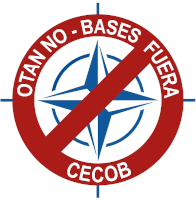POLITICAL FOUNDATIONS
This document sets out the arguments founding the call for creation of an Anti-Imperialist Front
Part one: The nature of imperialism
-
Imperialism and imperial expansion:
-
-
Imperialism is the form adopted by the capitalist mode of production at a certain point in its historical development, and as such is an expression of the class struggle.
-
Imperialism is a means of overcoming the contradictions in national capitalist and protectionist development.
-
Local crises produce surplus capital which has to be exported to generate profits. And the end purpose of capital concentration is to control prices, costs and markets to maintain profitability.
-
Hence imperial expansion does not depend on the will of particular historical agents.
-
The specific processes of domination driven by imperial expansion are means to an end rather than ends in themselves.
-
Once there were conflicts between imperial powers. What we have today are empires in conflict; there is a single imperialism of large transnationals which seeks to dominate the planet, essentially directed by the ‘western’ coalition led by the US.
-
There are no different imperialisms, only contradictions within the imperialist form of capitalism, which produce internal struggles for hegemony and external struggles to remove any obstacle to their expansion. Hegemonic imperial power seeks to discipline companies and States which try to maintain their independence from mechanisms of capital exportation and/or control of prices and /or markets.
-
-
Crisis:
-
-
Crises occur when it is no longer possible to maintain the process of economic accumulation.
-
They are, then, expressions of systemic problems, but also of all the measures the system adopts to apply its solutions to these problems of accumulation.
-
It is important to note the role of financial capital in the prevalence of speculative practices in offers of credit so as to maintain high levels of consumption in a population with declining income, which led to the bursting of the bubble and the worst crisis of capitalism in living memory.
-
Within the empire the crisis has been marked by mechanisms of domination and subjection, in labour relations and in cutbacks of public services, attacks on rights and freedoms, and increasing disciplinary measures, repression and militarization.
-
Beyond the imperial borders crises have historically been seized as opportunities for imperialist expansion, occupation of territories rich in raw materials, opening of trade routes and blocking of commercial competitors. In history crises have tended to be accompanied by war, entailing the destruction of surpluses and productive resources, followed by renewed accumulation and over-scaled military industries as drivers of economic growth.
-
-
War and victims:
-
-
Just as the development of imperialism is a product of capitalist crises, war is the response to crises of imperialism.
-
Since the counter-revolutionary wars following WW2 and the collapse of the USSR, we have been seeing wars waged to assure control in a crisis-ridden world.
-
Imperial expansion operates first through commercial and financial channels, followed by the establishment of factories and the acquisition of land and infrastructures. Populations are kept passive by the idea of a world of happy consumers.
-
By co-opting countries’ elites and governments, there is no need to resort to coercion; if this control is lost, the media and military resources already in place are activated and the war begins.
-
These wars adopt new, covert or more high-tech forms: psychological, economic, media, parliamentary coups, soft coups, drone warfare, militias, etc, designed to impose the imperial will without a formal declaration of war.
-
Military spending is constantly on the increase, weapons are becoming ever more deadly and there are armies occupying every strategic location on the planet. The military-industrial complex has a life of its own and is of course an essential part of the imperialist state. It assures imperial domination and at the same time produces huge profits while keeping a large part of the population occupied and consuming… But it is taxpayer-funded and hence drains surpluses from other sectors. It is in itself a major contradiction of Imperialism
-
Millions are dying because of war, 90% of them civilians and the majority among the most vulnerable: women and children. Refugees number over 70 million and only a small percentage reach the developed west; the rest are trapped in areas where resources are scarce even for the local population.
-
-
We are at war:
-
-
It is our belief that we are de facto at war: it is a “World-Wide War” driven by a western imperialist coalition led by the USA.
-
We are at war, even though the battlefronts are far from our frontiers; we are not spectators—we are leading perpetrators of the war.
-
By making war imperialism seeks to maintain and expand conditions of monopolistic exploitation, so as to secure investments and access to resources and markets in advantageous conditions. It wrecks resisting countries and disciplines the rest. Imperialist war does all that, and moreover seeks to justify all the military and media resources that it employs.
-
The imperial war strategy always follows the same pattern: criminalization and isolation of any sign of resistance, leading up to direct aggression whether openly or covertly.
-
We call this imperialist war because it seeks to dominate countries, regions or peoples by any military, political or economic means.
-
-
The West is directing the war and imperial expansion:
-
-
The imperialist war is directed by the western coalition, grouped essentially around NATO. But it is ruled by the USA, since the latter spends more on its military that the rest of the world put together, because it has more than 800 overseas military bases, and because it exercises general command.
-
Thanks to its close links to the majors of financial capital, international zionism is a principal driver of imperialist expansion. Moreover, the zionist entity called Israel, created as a neo-colony through the despoilment and genocide of the Palestinian people, acts as the gendarme of imperial control in the region, always with the support of the western countries, backed up by their nuclear arsenal.
-
The function of the European Union is to provide a structure for the defence of big business and the management of inter-imperialist contradictions in its member countries seeking to maintain their business interests in their former colonies, using the most despicable kinds of violence without the slightest regard for their populations. In order to project force outwards, the EU has determined to place its defence in the hands of NATO.
-
NATO members comprise 28 of the most developed North Atlantic states, including most of Eastern Europe. It is currently seeking to expand to countries beyond its natural boundaries, such as Israel, Georgia or Australia. Its cooperation agreements with Colombia mark a new high in the attrition against liberation processes in Latin America.
-
It is in the West that we find the nerve-centres of economic warfare, of soft coups, of proxy armies, of the great powers and NATO.
-
It is in the west that the weapons for use in these wars are designed and manufactured, and where the forces promoting the conflict are selectively recruited.
-
The western countries possess the largest stocks of weaponry, they have the greatest economic capacity and their political influence is overwhelming. Hence it is they who are behind all those massacres.
-
And yet the west teaches its population not to think about war and to accept things as presented to them by politicians, mass media and cultural industries: the west only acts in self-defence or in the cause of justice and human rights; their wars are against terrorism, against tyrannies, and most recently against the threat from Russia—and tomorrow it will be the threat from China.
-
This is the discourse that seeks to salve consciences and avert mobilizations like in the past; an Orwellian discourse where war is peace and the perpetrators are the victims.
-
The West sells security in exchange for false consciousness. Professionalization of armies, mercenarization of shock troops and proxy armies reduce the risk of deaths among our own soldiers to an acceptable level that does not cause alarm and contributes to a heroic myth, which helps feed armchair warmaking.
-
-
Encircling Russia and China:
-
-
In its time, the Soviet Union acted as a powerful brake on western imperialist expansion and as an aid to the maintenance of peace through international bodies. But the West was not prepared to accept the success of a form of social organization that questioned the very basis of capitalism. And so, NATO was created to surround it with armies.
-
Imperial expansion is not held back by rules or promises. Russia was an excellent western ally following the break-up of the Soviet Union.
-
When Russia began to follow its own path, establishing alliances and relations with other countries not in the thrall of imperialist power, and to rebuild its own independent military strength, it became an obstacle, and so an enemy.
-
The aggression system is in progress: criminalization, isolation and attack. The media battalions equate Russia with terrorism, sanctions are applied and it is encircled militarily, presaging a possible attack whose consequences are unimaginable. For the first time since the Cold War the west is preparing for a face-off between armies of equivalent power.
-
In their strategy of surrounding Russia, the EU and NATO have not shrunk from utilizing the worst dregs of criminal Nazism, promoting “colour revolutions” and the upsurge of fascism to secure weak, corrupt governments compliant with the imperial will in all the former Warsaw Pact countries and Soviet republics.
-
China’s turn is coming; its rapid productive, economic and commercial expansion is an intolerable challenge to US hegemony. The USA has consistently fomented tension by supporting Taiwan and deliberately avoiding closure of the Korean conflict, with an uninterrupted military presence for more than 67 years and a constant and destabilizing policy of provocation of China. The most worrying manifestation of that tension today is the deployment of anti-missile systems in Korea and the transfer of the largest ever US naval contingent to the Western Pacific, despite the lack of any real military threat.
-
Although Russia and China increasingly exhibit features of a capitalist logic and China for its part is venturing on an intensive campaign to promote its businesses worldwide, for the moment neither acts with the violence or rapacity that has characterized the colonial and neocolonial expansionism of western imperialism.
-
It is hard to imagine what a direct conflict between comparable mega-nuclear powers would look like. But the measures and strategies adopted in the cases of Russia and China show that the aim is to create threats credible enough to force internal changes favourable to western expansionism.
-
Be that as it may, the risk, implicit in this strategy, of unleashing a nuclear holocaust must most surely be judged a crime against humanity in and of itself.
-
Part Two: The need for an anti-imperialist front
-
Spain’s anti-imperialist record: The peoples of the Spanish state have conducted anti-war struggles in our recent history; the peace, civil disobedience, Anti-NATO and Anti-Iraq War movements are still remembered and still continue, albeit very debilitated.
-
Urgent now: There have been dreadful warlike acts in the last few years—acts that continue today practically without response. Israeli attacks on Lebanon and Gaza, invasion and destruction of Afghanistan, Iraq and Libya by the western coalition and NATO, invasion of Syria by mercenary armies, colour revolutions and coups in the Caucasus and Ukraine, interference and economic war against Venezuela, blockading of Cuba, permanent attrition against Korea, etc.
-
The responsibility of the Spanish state:
-
-
The Spanish state is not just any member of the imperialist coalition, but one of the most important. Spain hosts essential bases and command centres of the imperialist command structure, which have played a background role in all the operations that have been organized since the first Gulf War and the war to destroy Yugoslavia.
-
We are members of NATO and have taken part in 50 missions in 30 countries, mobilizing 138,000 soldiers at a cost of 160 deaths. Participation in international NATO operations or under bilateral agreements is the first source of merits for promotion of Spanish officers, which gradually reinforces their imperialist nature.
-
And yet, as far as the bulk of our population are concerned, not only are we not at war but we are effectively contributing to peace and we accept new, higher military expenditure for these purposes.
-
But we are unaware of the risks this entails, and above all of our responsibility for imperialist aggression, in which we are active participants. We are also unaware of the extent to which we are subjugated, given that we have no control over the military forces occupying our territory.
-
-
Resistance and anti-imperialism:
-
-
Any process of domination can produce resistance, both in subjugated regions and within the empire itself. There are many forms of resistance, and these may vary in the way they progress over time, without being inhibited by the utter disproportion between the forces, as in the case of Palestine.
-
Resistance is the only way to combat imperialist expansion and war. Expanding imperialism does not negotiate. Resistance implies a political commitment to work towards a socialist society: to resist by building a different society—or rather to build another society by resisting.
-
Internationalism is the opposite of imperialism; it is the recognition of other societies as equals, respecting their differences. It is based on cooperation and mutual benefit and implies internationalist solidarity, i.e. class solidarity.
-
Exploitation and domination are necessary aspects of the imperialist system, which always acts to prevent any change in the system. Therefore, it is essential that anti-imperialism become an inalienable part of all popular-based policies and all processes of social change, retrieving the notion of socialism as the ultimate goal.
-
-
Against equidistance:
-
-
No movement that calls itself one for change, be it political, economic, gender struggle or social struggle, including anti-fascist movements, is really such if its struggle does not include anti-imperialism, internationalism and firm denunciation of NATO.
-
Unless resistance movements that pursue alternatives to the crisis-racked system are forthcoming, that same system will promote fascism, as has already happened in the past. Anti-imperialist resistance is necessarily anti-fascist.
-
To claim that in the face of imperialist expansion one is neither with one side nor the other is to be tolerant of those who forcibly impose their will.
-
This is like judging imperialism and the forces of resistance as equally objectionable, forces that are systematically accused of violating freedoms and human rights by the very same imperialists.
-
It is always worth asking who decides who is a tyrant, who decides how to get rid of him, who determines what the outcome will be—it is always the imperialist ‘coalition’; nevertheless, the important thing for them is to get rid of what the political classes and the mainstream media are criminalizing.
-
As long as the capital-labour contradiction exists, the workers will be forced to defend their class interests as effectively as possible. And that applies to any country, whether or not it has the seal of democratic approval.
-
When this struggle emerges, it is internationalist solidarity that is needed, not imperialism posing as saviour. The neither-nors of the western left seem to adhere to the same model of society as the imperialist west and hence call for and accept its intervention.
-
Solidarity movements must be persuaded to expose and denounce the link between the victims’ suffering and its causes, unmasking the human aid organizations which appeal to emotions while concealing those responsible for the disaster.
-
To accept the imperialist strategy of demonization, isolation and attack and to justify such acceptance as not siding with one or the other is to accept the logic of hegemony-seeking power.
-
-
Fragmentation:
-
-
Fragmentation is an essential element of the dominant discourse and imperialist strategy.
-
Reality is broken down to make it difficult to understand and to be able to manipulate our minds and so conceal their true interests. Social organizations and resistance movements are fragmented to facilitate control and prevent the building of a common front. We are driven to accept this fragmentation and to act essentially on the basis of our nearest interests.
-
Many of our organizations, many of the groups and individuals who explicitly or implicitly defend shared ideas in opposition to imperialism, operate in this fragmented context.
-
Solidarity and resistance are scant and are largely discontinuous. We lack unity of action. Such unity of action is only ever achieved in extraordinary circumstances.
-
-
Concerted action:
-
-
There is a lack of unity of action in building commons, discussing, working and acting together, creating common spheres that are as attractive and gratifying as the originating organizations—spheres that offer different, broader goals, and above all that enable us to organize an effective resistance.
-
The worst is that those general principles that we share are abandoned in no-man’s-land, because they need that common space to be developed.
-
So why then is this not one of our priority goals? The diagnosis of the situation and the discussions on the need for concerted action seem to be inadequate. Everything suggests that beneath the tremendous pressure being brought to bear on us, we tend to protect ourselves in like-minded environments.
-
Working in our own sphere we can survive and keep up a certain level of resistance, but in the present conditions that work has little chance of achieving even partial goals.
-
We are aware of the importance of each partial struggle; but nonetheless we need to understand that each one of them addresses partial aspects of a single, hostile reality, and that that aspect of reality cannot be changed without a complete change of the whole.
-
It seems obvious but it needs to be stressed: only by joining forces can we hope to make a real difference. We need a better correlation of forces to be able to set new partial and sectoral goals and commonly-established objectives.
-
Each movement has specific characteristics, difficulties, histories and circumstances; but at the same time there are common features and needs that can help enhance the strength and potential of each one – if we are capable of developing cooperation and internationalism.
-





